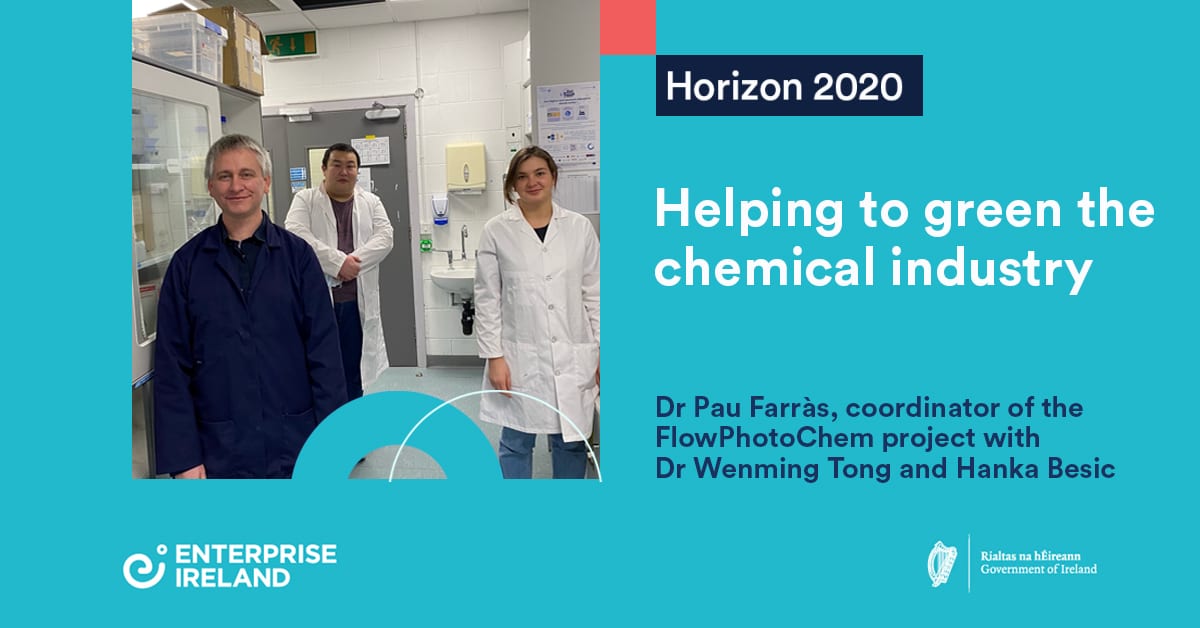“Innovation activities in the area of solar energy conversion technology, including solar chemicals, are key to achieving the decarbonisation targets set by the EU.”
Dr Pau Farràs, coordinator of the FlowPhotoChem project
Key Takeouts:
Case Study: FlowPhotoChem
If the European Union is to achieve its target of a climate neutral economy by 2050, which will involve reducing carbon dioxide (CO2) emissions by 80–95%, new and disruptive approaches and technologies is needed across all sectors. Reducing emissions is a challenge, in particular, for the chemical industry, one of Europe’s largest manufacturing sectors but also one of the most polluting, emitting over 145 million tonnes of CO2 equivalents each year.
The Horizon 2020-funded FlowPhotoChem project is one of many innovative projects currently developing technology that will help to reduce the chemical sector’s CO2 emissions. The project aims to develop an integrated system of modular reactors that consumes CO2 and uses concentrated sunlight to form ethylene.
Involving 14 partners from eight countries, €6.99 million in EU funding and led by Dr Pau Farràs from the Ryan Institute, NUI Galway, FlowPhotoChem will produce ethylene as a proof-of-concept and will pave the way for a range of other green chemicals to be produced solely from sunlight, water and CO2.
“Innovation activities in the area of solar energy conversion technology, including solar chemicals, are key to achieving the decarbonisation targets set by the EU,” says Dr Farràs.
Combining the expertise of research teams from Ireland, Germany, Hungary, Spain, Switzerland, the Netherlands, Uganda and the UK, FlowPhotoChem’s technology is innovative and so too is the overall aim of the project. “Our new technologies will enable the production of chemicals using solar energy to be carried out in small-scale installations and not just in large-scale infrastructures as at present,” says Dr Farràs. For example, this technology can be used to create small devices that could produce hydrogen peroxide to purify water, responding to the needs of rural, isolated areas in sun-rich countries.”
Unique platform for collaboration
Alongside FlowPhotoChem, Dr Farràs is involved in a number of other EU-funded projects related to green energy and chemicals, including Solar2Chem, SeaFuel and HUGE, and recognises that funding mechanisms such as Horizon 2020 offer a unique platform.
“A wide range of skills is needed on an ambitious project like this, beyond what an individual organisation would have, so collaboration with different partners is compulsory to achieving our goals,” says Dr Farràs
As coordinator of the project, Dr Farràs is tasked not only with keeping on top of the development of the technology but also with managing the integration of academics and industry with different skills.
“Our approach is to manage the individual work packages through monthly conference calls to keep everyone engaged and make sure we are on track with the work. This means that when we have larger meetings with all partners, we can talk about the bigger picture because the technical details have already been covered. This kind of management structure is working well. I feel it’s important to have face-to-face interactions; at the moment it’s all virtual meetings but we’re planning for physical workshops next year.”
Advice for Horizon 2020 applicants
Horizon 2020 had a budget of over €80 billion over seven years and its successor, Horizon Europe, will have a significantly bigger budget offering immense opportunities for individuals and consortia to secure funding for cutting-edge research.
However, some potential applicants are wary of the paperwork involved in securing funding.
“It’s true that there is a lot of work involved in putting together projects like this,” admits Dr Farràs. “But my advice would be to use the help that’s available. The support from Enterprise Ireland is fantastic. For both the FlowPhotoChem and the Solar2Chem projects, I applied for and received the Enterprise Ireland Coordinator Grant.
“I needed someone not only to review the proposals but also to help write them. Thanks to the Coordinator Grant I was able to work with a consultant who had a lot of experience in this area, and who also helped with the administrative side of things,” says Dr Farràs
“It was also good that FlowPhotoChem was a two-stage call so the shorter document that we had written for the first stage helped with the longer second stage proposal.”
Personal and professional benefits
Helping to create world-changing technologies brings its own rewards but beyond that the Horizon experience offers personal and professional benefits.
“First of all, when you undertake research with other groups the impact of your research is improved. We’re also seeing that the Horizon proposals increasingly ask for information on the social aspects of the project as well as technical content, so it’s a great way to meet people from both your own discipline and from others,” says Dr Farràs.
“No matter what stage you are at in your career there are benefits to being involved in these projects. For example, there are eight PhD students involved in the FlowPhotoChem research. It’s a great opportunity for them as they will see their individual tasks converge at the end into the final system contributing to a specific and significant application.”
For advice or further information about applying for Horizon 2020 support please contact h2020support@enterprise-ireland.com or consult www.horizon2020.ie




